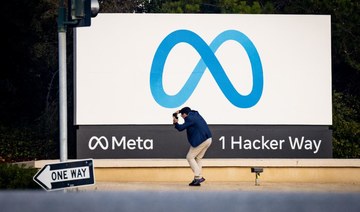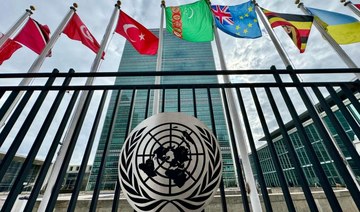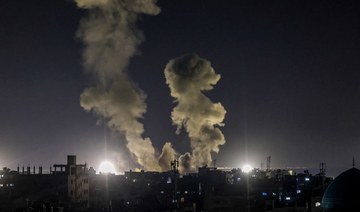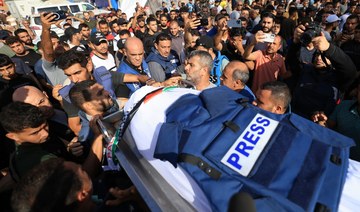JEDDAH: Roger Harrison, who has died on the Spanish island of Mallorca at the age of 75, was a man of more than one career and many talents — among them an event organizer, a writer and photographer, a jeweler and gemologist, a lecturer and raconteur.
Here at Arab News, where he was a senior reporter from 2001 to 2013 covering Saudi affairs and expat life, he will be best remembered as a news magnet to whom stories simply happened.
Among Harrison’s many achievements was his work on the book Wings Over Arabia, a photographic record of a three-man glider team flying over and photographing spectacular and rarely seen areas of the Kingdom. The team included Prince Sultan bin Salman, the first Arab and Muslim astronaut, and Prince Bandar bin Khaled Al-Faisal.
In his preface to the book, Prince Bandar paid tribute to Harrison’s abilities and his work: “He captures the beauty of my country from a perspective that most of the population will never experience. I thank him sincerely for writing and photographing a definitive work that is both a fascinating story and, perhaps, a source of inspiration for future glider pilots.”
So fascinated was the British historian Robert Lacey by Harrison’s work that he wrote: “Lawrence of Arabia captured it from a camel. Roger Harrison captures it from the air. Both convey the magic of Arabia with breathtaking power.”
Harrison was also one of the last journalists to interview the famed explorer of Arabia and the Middle East, Sir Wilfred Thesiger, in 2002.
Stories had a way of coming to Harrison. One of his last visits to Saudi Arabia was in October 2019, when he was invited to a government-sponsored media conference just as visas on arrival became available to foreigners. Harrison flew into Jeddah from London, and offered to pay the visa fee by credit card, prompting a bank security request to enter a one-time password — which was sent to his cell phone back in London. It seemed an insoluble problem, but the Saudi officer at the airport offered to pay the fee. Harrison assured him he would be repaid as soon as the problem was sorted out, but the officer said: “You are our guest. You don’t have to worry.”
Later Harrison regaled the Arab News Jeddah newsroom with the tale, his eyes filling with tears as he told how a complete stranger had come unhesitatingly to his assistance. He loved Saudi Arabia, and the Saudis loved him back in equal measure.
Harrison was born in Eastbourne, England, in 1946. He arrived in Saudi Arabia with his wife Sian in September 1996, to teach at Jubail Industrial College, where he remained for four years. The couple then went back to London, but the Kingdom had made its mark on Harrison and he returned to Jeddah to teach English to the Saudi Navy.
Harrison’s career with Arab News began by accident — quite literally. He and his wife were involved in a collision with a car that came out of the desert and ran straight into them. Harrison wrote a letter to the newspaper describing the incident, and Arab News replied asking him to write it in the form of an article rather than a letter. The piece appeared on the front page under the headline: “Why throw yourself to death when you can drive there?” The article led to an offer of employment at Arab News.
“He loved the people he worked with and he loved the opportunities the paper gave him,” his wife Sian said. “He went to places he would never have visited and was even able to indulge his love of racing by test-driving cars he could never have owned. The articles he wrote, especially ‘Adam and Eid,’ showed the depth of his humanity and his love of Saudi Arabia and its people. There were so many articles that displayed this empathetic side of Roger. The one he wrote after the dreadful floods of Jeddah was more personal, about the many friends who helped us.”
The Harrisons left Jeddah in 2013 and went to live in Ras Al-Khaimah in the UAE. He had visited once to write an article, and liked the idea of being there while still close to Saudi Arabia. The couple’s son Ben, a newly qualified teacher, came from London to join them and applied for his first teaching post — in Riyadh. “Roger was thrilled the Harrison connection was continuing in the Kingdom and gave him a reason to visit,” Sian said. “Ben left Riyadh in 2019 and was going to accompany Roger on a trip to Saudi Arabia in January, when they wanted to do a follow-up to the Wings Over Arabia book, but this time from the ground.”
Ben Harrison hopes to return for a visit, and would love to be able to honor his father’s last wish.
In 2017, the Harrisons moved to Mallorca, which they knew well from visits over the years. Why Mallorca? “We had been visiting the beautiful Spanish island for over 20 years since my sister had moved to live there,” said Sian. “My mother also sold up and left London to live in Mallorca. She was very close to Roger. They loved to debate and had many spirited conversations, and the highlight of their week was a shopping trip to Lidl where they discussed anything and everything.”
Sian has received many messages of condolence from people who knew her husband. “They have shown me a side of him that truly shows the honorable and honest man he was, his old-fashioned values of being true to your word, his love for the Kingdom and the opportunities it gave him. I can’t stress enough how much being in Saudi Arabia meant to him.”
Harrison had great respect for Saudi Arabia, and was adamant in correcting people’s misconceptions about the Kingdom. He regularly called UK radio stations and wrote letters to various publications out of a sincere desire to set the record straight. As Prince Sultan bin Salman once said, Harrison knew more about Saudi Arabia than most Saudis.
“Although I never had the pleasure of working with Roger, I have crossed paths many times with him covering events in Jeddah in the early 2000s. He was full of passion for journalism and for the Kingdom, was kind to everyone around him and was always the first to arrive and last to leave during any press event,” said Faisal J. Abbas, current Editor in Chief of Arab News.
“Obviously, we at Arab News extend our condolences to Roger’s family, and on behalf of all the editors and colleagues he worked with in the past, we thank him for all the work he has done and all his contributions to our newspaper,” he added.
Harrison’s motto was: “Everybody dies, but some never live.” He lived a remarkable life in a remarkable country, and documented all that he could for future historians and writers of Arabia. He was a gentle soul, a humanist first and journalist last. Among those who admired and respected him is Razan Baker, director of international communication at the Saudi Arabian Olympic Committee.
“He touched many lives, including my own, and for that I consider myself lucky,” she said. “I was honored to know him as one of my dearest Arab News family members. He was always inspiring and motivating. Nothing was impossible for him. He was like a generous moving library that challenged us all to learn, be passionate about what we love and do, and try to do it better.”
Remembering Roger Harrison: He loved the Kingdom, and Saudis loved him back in equal measure
https://arab.news/c88cm
Remembering Roger Harrison: He loved the Kingdom, and Saudis loved him back in equal measure
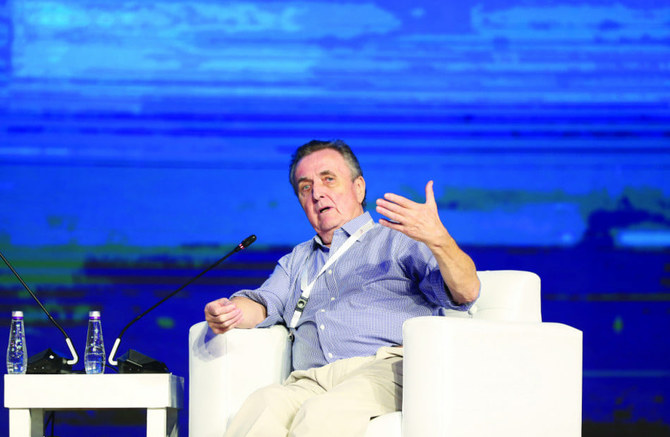
- Family, friends and former colleagues mourn man of many talents with 25-year connection to Saudi Arabia
Meta ‘temporarily’ closes Threads network in Turkiye

- Decision was taken to comply with injunction prohibiting data sharing with Instagram
- Ruling do not imlact Meta’s other services like Facebook, Instagram and WhatsApp
ISTANBUL: Facebook owner Meta said Monday it would “temporarily” shut down its Threads short-messaging service in Turkiye after an order from Ankara’s competition watchdog over data-sharing.
The interim ruling from the Turkish Competition Authority (TCA) has “no impact” for Meta’s other services like Facebook, Instagram and WhatsApp in Turkiye, the company said in a statement posted to its website.
“We disagree with the interim order, we believe we are in compliance with all Turkish legal requirements, and we will appeal,” Meta said — although it had “no choice but to temporarily shut down Threads” in Turkiye.
Meta launched Threads last year as a competitor to X (formerly Twitter), with boss Mark Zuckerberg saying in February the service had 130 million monthly users worldwide.
It was available in Turkiye from the start, while European Union users had to wait months for Meta to come up with a version adapted to strict data protection and competition laws.
In its March finding, the TCA had said Meta’s combination of user data from Instagram with people’s Threads profiles “will lead to irreparable harms.”
Given its vast user base, data collection and financial resources, “Meta’s practices in the market constitute a barrier to entry” for prospective competitors, the authority added.
Meta said it would allow existing Threads users to delete or deactivate their profiles ahead of the April 29 cut-off, with a chance of reactivating them should the ruling be overturned.
British TV presenter under fire for ‘Islamophobic’ tweet in aftermath of Sydney mall attack

- Critics say Rachel Riley should be sacked after she draws parallel between calls for Palestinian intifada and unrelated attack in Australia that left 6 people dead
- The ‘Countdown’ star later clarifies her comments and says she apologizes if her message was ‘misunderstood’
LONDON: British TV presenter Rachel Riley has responded to criticisms she received after posting a message on social media platform X in which she appeared to link a stabbing rampage at a Sydney shopping mall on Saturday, which left six people dead, with ongoing protests calling for a Palestinian “intifada,” or uprising.
The celebrity, best known for appearing on the Channel 4 game shows “Countdown” and “8 out of 10 Cats Does Countdown” said she apologized if her words had been “misunderstood.”
In a message posted soon after the attacks, Riley, whose mother is Jewish, wrote: “For six months now, people have been out on our streets proudly calling for the ‘Intifada Revolution’. If you want to know what ‘Globalised Intifada’ looks like, see the Sydney Mall.”
She immediately faced a backlash, including accusations of racism and Islamophobia and calls for her to be sacked by Channel 4.
Do not let Rachel Riley get away with it.
— Bushra Shaikh (@Bushra1Shaikh) April 14, 2024
Her words: "If you want to know what ‘Globalise the Intifada’ looks like, see the Sydney Mall."
"Sydney mall, multiple times over is what they’ve been proudly calling for."
She is full of it and knows exactly what she meant. I hope… https://t.co/iLBwHxnGby
In response, she posted a message on Sunday in which she said her tweet was not intended to link the attack in Sydney to Islamic extremism, but rather to question the continuing tolerance for protests in London and around the world calling for “intifada,” which she equates with “violence on our streets.”
She wrote: “Sadly, the type of attack seen in Sydney yesterday is exactly the kind of violence the previous intifada involved and I hope to avoid in future, but in my opinion ignoring the problem won’t make it go away.
“Attacks on Jews have recently become repackaged as ‘resistance’ in some circles, and we should in one voice condemn all acts of violence, whoever the perpetrators and whoever the victims.
“I am sorry if this message was misunderstood, that was not my intention.”
Despite her clarification, she continued to face criticism online, including accusations that her response was “insufficient” and she was engaging in “self-centered self-victimization” in an attempt to evade responsibility.
Honestly, everyone has had enough @Channel4. This is not an apology. It is self-centred, self victimisation to get away from addressing her islamophobia. She's posts diagusting, racist content and uses her identity to escape responsibility, this isn't good enough. https://t.co/u1dCJ2vkzC
— lachimalola⁷ (@Drrrivvveee) April 15, 2024
On Saturday, Joel Cauchi attacked a number of people, mostly women, at the Westfield Bondi Junction mall killing five women and a man. Several others, including a baby girl, were injured before Cauchi was shot dead by police. Australian authorities have said the attack was not related to terrorism and most likely linked to the attacker’s mental health issues.
Lebanese newspaper introduces ‘AI President’ in effort to break political deadlock
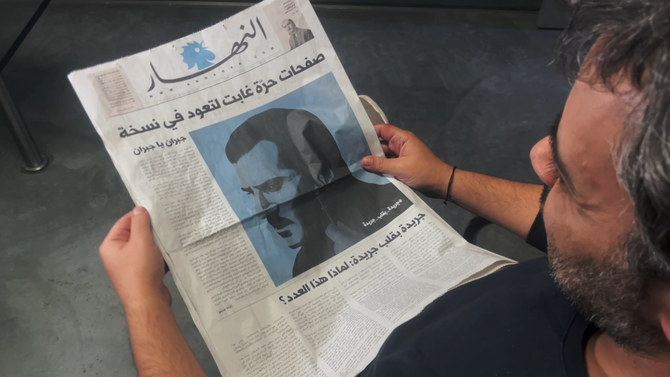
- Artificial intelligence tool’s ‘deep understanding’ of country equips it to address issues effectively, AnNahar newspaper says
- Lebanon has been without a president for more than two years
LONDON: A Lebanese newspaper has launched what it claims is the world’s first artificial intelligence tool designed to assume presidential duties for a nation, in an attempt to break the long-standing deadlock over who should assume the country’s presidency.
Arabic-language daily AnNahar said the program, which it has called “AI President,” has been trained on an archive of 90 years of “impartial journalism” from its pages. The program analyzes historical data and current events to provide answers to political, legal, and governmental questions.
With its “deep understanding” of Lebanon’s history, “AI President” aims to provide an “unbiased perspective” on the country’s current challenges.
The launch was announced in a live broadcast by Nayla Tueni, AnNahar’s editor-in-chief, who conducted an interview with the software regarding Lebanon’s current issues and potential solutions to them.
Lebanon is facing a number of long-running socio-economic crises, with over 80 percent of the population now reported to be living in poverty.
The country has been without a president for more than two years, despite 13 unsuccessful attempts by the Lebanese parliament to elect one.
Tueni hopes “AI President” will help break the political stalemate and restore confidence in the system.
“We refuse to sit back and allow things to go on as they have. To not have a president for this long is unacceptable and has impacted the country negatively,” Tueni said. “If the parliament will not do its job to elect a president, then the people will bring Lebanon a president.”
“AI President” will be accessible through the website OurPresident.ai to answer questions on Lebanese politics.
Republican hardliners blame Biden administration after Huawei unveils laptop with new Intel AI chip

- A special license issued by the Trump administration has allowed Intel to ship central processors to Huawei for use in laptops since 2020
- In August, Huawei unveiled a new phone powered by a sophisticated chip manufactured by sanctioned Chinese chipmaker SMIC
WASHINGTON: Republican US lawmakers on Friday criticized the Biden administration after sanctioned Chinese telecoms equipment giant Huawei unveiled a laptop this week powered by an Intel AI chip.
The United States placed Huawei on a trade restriction list in 2019 for violating Iran sanctions, part of a broader effort to hobble Beijing’s technological advances. Placement on the list means the company’s suppliers have to seek a special, difficult-to-obtain license before shipping to it.
One such license, issued by the Trump administration, has allowed Intel to ship central processors to Huawei for use in laptops since 2020. China hard-liners had urged the Biden administration to revoke that license, but many grudgingly accepted that it would expire later this year and not be renewed.
Huawei’s unveiling Thursday of its first AI-enabled laptop, the MateBook X Pro powered by Intel’s new Core Ultra 9 processor, shocked and angered them, because it suggested to them that the Commerce Department had approved shipments of the new chip to Huawei.
“One of the greatest mysteries in Washington, DC is why the Department of Commerce continues to allow US technology to be shipped to Huawei” Republican Congressman Michael Gallagher, who chairs the House of Representatives select committee on China, said in a statement to Reuters.
A source familiar with the matter said the chips were shipped under a preexisting license. They are not covered by recent broad-cased restrictions on AI chip shipments to China, the source and another person said.
The Commerce Department and Intel declined to comment. Huawei did not immediately respond to requests for comment.
The reaction is a sign of growing pressure on the Biden administration to do more to thwart Huawei’s rise, nearly five years after it was added to a trade restriction list.
In August, it shocked the world with a new phone powered by a sophisticated chip manufactured by sanctioned Chinese chipmaker SMIC, becoming a symbol of China’s technological resurgence despite Washington’s ongoing efforts to cripple its capacity to produce advanced semiconductors.
At a Senate subcommittee hearing this week, Kevin Kurland, an export enforcement official, said Washington’s restrictions on Huawei have had a “significant impact” on it access to US technology. He also stressed that the goal was not necessarily to stop Huawei from growing but to keep it from misusing US technology for “malign activities.”
But the remarks did little to stem frustration among Republican China hawks following the news about Huawei’s new laptop.
“These approvals must stop,” Republican congressman Michael McCaul said in a statement to Reuters. “Two years ago, I was told licenses to Huawei would stop. Today, it doesn’t seem as though the policy has changed.”
Three Palestinian journalists injured in Israeli strike on Gaza’s Nuseirat camp
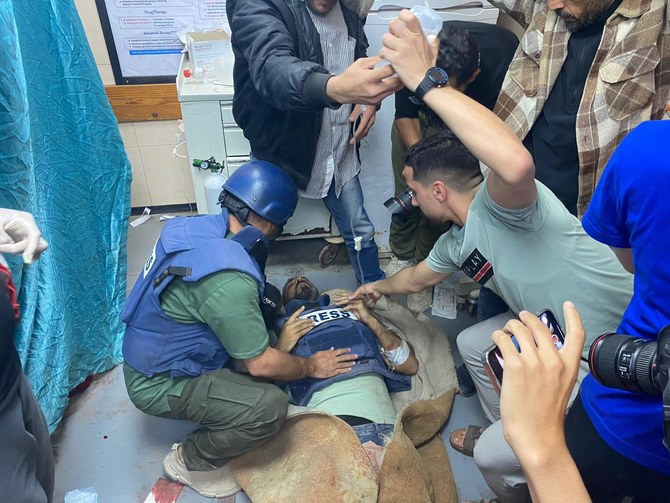
- The 3 reporters were taken to Shohada Al-Aqsa Hospital in Deir Al-Balah
- Journalist Sami Shehada lost his leg in the attack
GAZA: Three Palestinian journalists were injured in an Israeli airstrike on the Nuseirat refugee camp in Gaza on Friday.
Sami Shehada and Sami Barhoum were covering the events for the TRT Arabic TV channel, while Ahmad Harb was on duty for Al Arabiya News Channel at the time of the incident.
All three journalists were first taken to Al-Awda Hospital, a small facility in the north of the enclave, but later transferred to Shohada Al-Aqsa Hospital in Deir Al-Balah in the central Gaza Strip.
Shehada lost a leg in the attack, which reportedly directly targeted the media team.
“(We) were in a (relatively) safe spot, wearing our press armor and helmets,” Shehada told Arab News. “Even the car I arrived in was labeled ‘TV,’ and I’m a civilian and a journalist — they targeted us.”
Since Oct. 7, at least 122 journalists have been killed by Israeli strikes, according to UN figures, and many more have been injured.
UN experts said in February that they were “alarmed at the extraordinarily high numbers of journalists and media workers who have been killed, attacked, injured and detained in the Occupied Palestinian Territory, particularly in Gaza, in recent months, blatantly disregarding international law. We condemn all killings, threats and attacks on journalists and call on all parties to the conflict to protect them.”



